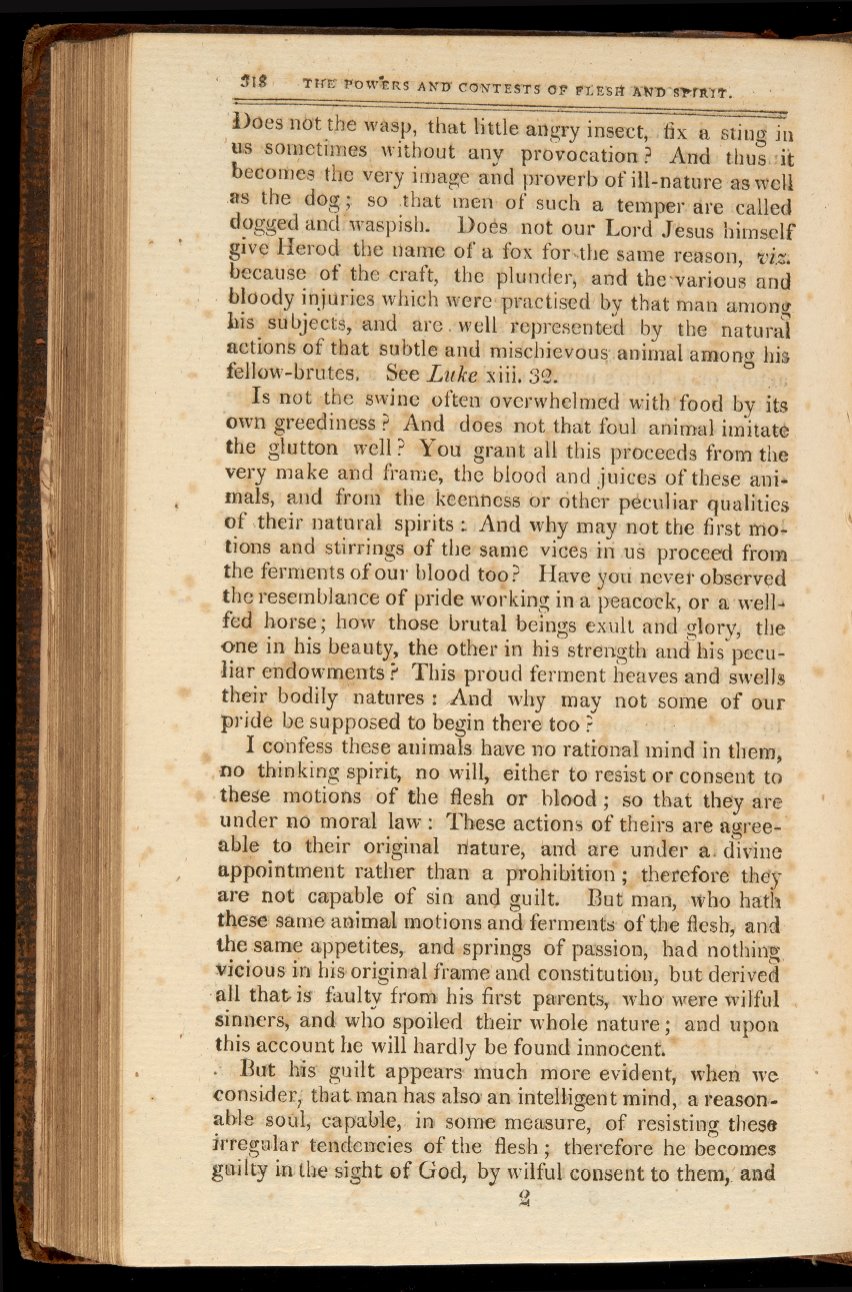

318
YOWERS
AND'
CONTESTS
OF
tr"LE'SFY
ÄND-SPrRYT.
Does not
the
wasp,
that
little
angry insect,
fix
a
sting
in
us
sometimes without any
provocation
?
And thus it
becomes the very image
and proverb of
ill
-
nature
as
well
as the dog
;
so
that
men
of
such
a temper are
called
dogged and
waspish.
Does not our Lord Jesus himself
give
Herod
the name
of
a
fox
for,the
same
reason,
viz.
because
of
the craft, the
plunder, and
the various and
bloody injuries
which were
practised
by
that
man among
bis
subjects, and are .well
represented
by
the
natural
actions of
that
subtle
and mischievous animal among
his
fellow
-
brutes,
See
Luke
xiii. 32.
Is
not
the
swine
often
overwhelmed
with
food
by
its
own
greediness
?
And
does
not that
foul
animal imitate
the glutton
well
?
You
grant
all this
proceeds
from
the
very make and
frame,
the
blood
and
juices of
these
ani-
mals,
and from the
keenness
or
Other
peculiar qualities
of
their natural
spirits
:
And
why
may
not
the first
rrio-
tions
and stirrings
of
the same
vices
in us
proceed
from
the ferments
of
our
blood too?
Have
yoú
never
observed
the resemblance
of
pride working
in
a
peacock,
or a
well
-
fed
horse;
how
those
brutal
beings
exult and
glory,
the
one
in
his
beauty, the
other
in
his
strength
and
his
pecu-
liar
endowments
?
This proud ferment
heaves and
swells
their bodily natures
:
And
why
may
not
some
of
our
pride
be
supposed
to begin
there
too
?
I
confess these
animals
have no
rational
mind
in
them,
no thinking
spirit, no
will,
either
to resist
or consent
to
these motions
Of
the
flesh
or
blood
;
so
that
they
are
under
no
moral
law
:
These
actions
of
theirs
are agree-
able
to
their
original nature, and
are under
a.
divine
appointment
rather
than a prohibition
;
therefore
they
are not
capable
of
sin
and guilt.
But
man, who
hath
these
same animal motions
and
ferments
of
the flesh, and
the same
appetites, and
springs
of
passion,
had
nothing,
vicious
in
his original frame
and constitution,
but
derived
all
that
is
faulty from
his
first parents,
who'
were
wilful
sinners,
and.
who
spoiled
their
whole
nature;
and upon
this
account
he will
hardly
be
found innocent.
But his guilt
appears' much more evident,
when we
consider,
that
man has
also an intelligent
mind, a
reason
-
able
soul,
capable,
in
some
measure,
of
resisting these
irregular
tendencies
of
the
flesh
;
therefore
he becomes
guilty in
the
sight
of
God,
by wilful
consent
to them,
and
o
7

















